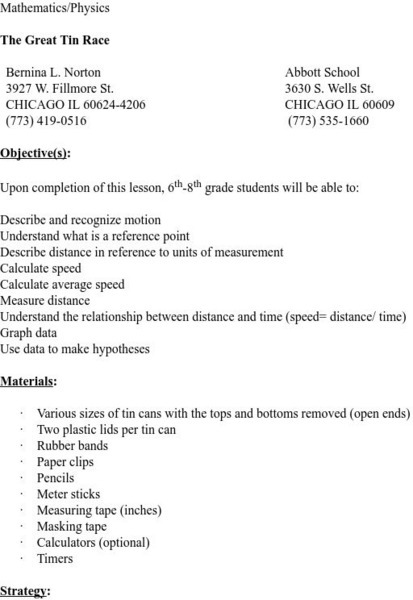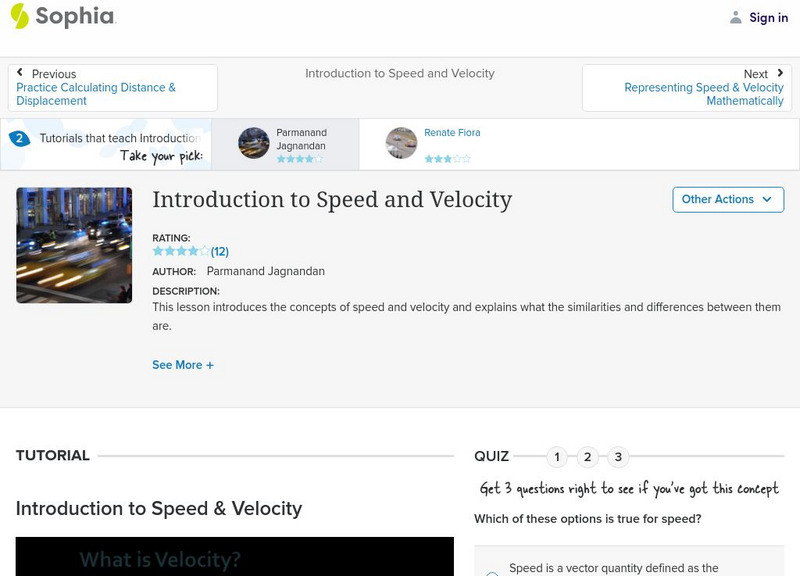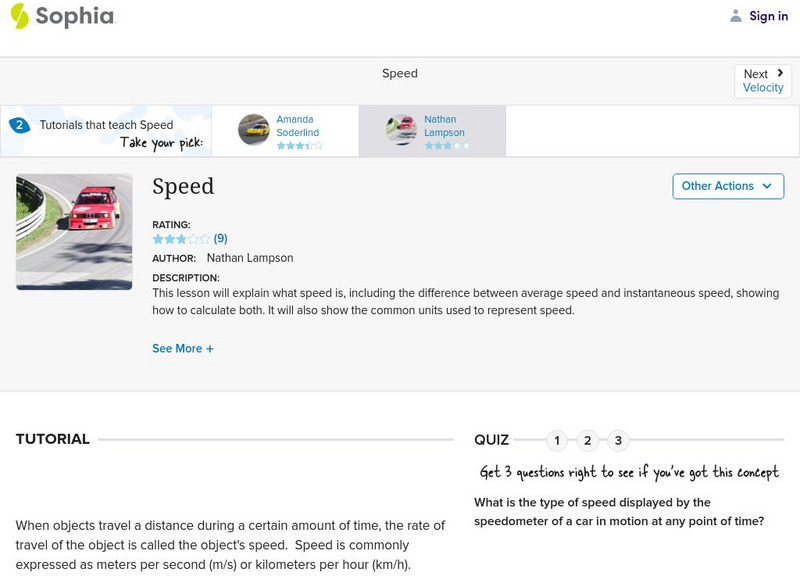Hi, what do you want to do?
Khan Academy
Khan Academy: What Is Centripetal Acceleration?
Learn what centripetal acceleration means and how to calculate it. Included are two example problems with solutions.
Shodor Education Foundation
Shodor Interactivate: Incline
This applet allows the user to make observations about the relationship between speed and position and how both of these are affected by initial velocity and the incline on which the biker is traveling.
CK-12 Foundation
Ck 12: Fourth Grade Science
This customizable digital textbook covers topics related to fourth-grade science. It is Next Generation Science Standards (NGSS) aligned.
National Council of Teachers of Mathematics
Nctm: Figure This: Can You Run as Fast as a Car?
During the 100 meter dash in the 1988 Olympic Games in Seoul, Florence Griffth-Joyner was timed at 0.91 seconds for 10 meters. At that speed, could she pass a car traveling 15 miles per hour in a school zone?
Khan Academy
Khan Academy: What Is Velocity?
Velocity or speed? Instantaneous or average? Keep building your physics vocabulary.
National Council of Teachers of Mathematics
Nctm: Figure This: The Race [Pdf]
A challenge that combines skills in problem solving and logical reasoning. See if you can figure out who will win the race by determining the rate of speed of each runner. A one page activity from NCTM Math Challenges for Families...
NumberNut
Number Nut: Breaking a Minute Into Seconds
Minutes become seconds in this lesson that focuses on time and measurement. This brief integrated lesson also explores science concepts regarding the relevance of a second. Fractions of seconds and decimals are also mentioned. The lesson...
Science and Mathematics Initiative for Learning Enhancement (SMILE)
Smile: The Great Tin Race
This activity is a great way to show distance and time relationships while incorporating charts and graphing. Different sized tins are raced against each other, and data is collected.
My Science Site
Forces and Motion [Pdf]
This resource provides reproducibles that aide in student learning of force and motion. Also offers hands-on and cooperative learning activity ideas as well as an ESL/ELD activity. This resource is in PDF form; requires Adobe Reader.
PBS
Pbs Teachers:reaction Time
Employ techniques of scientific observation to test and measure your reaction time. Repeat the test several times to make conclusions about whether the time between a stimulus and a response can be improved with practice.
Treehut
Suzy's World: Black Holes
Use this site to find out what is a black hole in space and try an experiment.
Treehut
Suzy's World: Blood
Use this site to find out why your body needs blood with this quick fact sheet. You can also try an experiment with your pulse.
Center of Science and Industry
Cosi Columbus: Paper Cup Anemometer
Make your own anemometer like meteorologists use to measure the speed of wind. Includes full list of materials, procedures, and scientific explanation of what makes wind.
Middle School Science
Middle School Science: Motion Crossword Puzzle
Let your students have a little fun and reinforce their learning of motion-related concepts at the same time.
Middle School Science
Middle School Science: Motion Notes
Personal site in which a teacher outlines a unit on motion. Probes through topics such as average speed, velocity, acceleration, speed, deceleration, force and more.
Middle School Science
Middle School Science: Balloon Powered Race Cars
An idea developed by a physical science teacher who applied Newton's Laws of Motion in creating a balloon powered race car. Find simple objective, materials, rules, and procedures.
Sophia Learning
Sophia: Introduction to Speed and Velocity: Lesson 1
This lesson introduces the concepts of speed and velocity and explains what the similarities and differences between them are. It is 1 of 2 in the series titled "Introduction to Speed and Velocity."
Sophia Learning
Sophia: Kinetic Friction & Speed: Lesson 2
This lesson explains why kinetic friction does not depend on how quickly an object is sliding across a surface. It is 2 of 2 in the series titled "Kinetic Friction & Speed."
Sophia Learning
Sophia: Speed: Lesson 2
This lesson will explain what speed is, including the difference between average speed and instantaneous speed, showing how to calculate both. It will also show the common units used to represent speed. It is 2 of 2 in the series titled...
Sophia Learning
Sophia: Velocity: Lesson 3
This lesson will introduce the concept of velocity, explaining what it is, how it is calculated, and common units used to represent it. It is 3 of 3 in the series titled "Velocity."
Ducksters
Ducksters: Physics for Kids: Speed and Velocity
Kids learn about speed and velocity in the science of physics and the laws of motion including units and measurement. What is the difference between speed and velocity?
ClassFlow
Class Flow: Speed
[Free Registration/Login Required] Students apply a formula to solve problems involving speed, distance and time.
Math Is Fun
Math Is Fun: Metric Speed (Velocity)
Simple definitions explain how speed and velocity are related. A brief list of examples will show you different speeds that you observe in real life situations.
ClassFlow
Class Flow: Chemical Kinetics and Alkane Nomenclature
[Free Registration/Login Required] This flipchart covers essential concepts of factors that affect a chemical reaction and nomenclature of Alkenes.








![Nctm: Figure This: The Race [Pdf] Activity Nctm: Figure This: The Race [Pdf] Activity](https://content.lessonplanet.com/knovation/original/21689-eb1624724f217ea0d5cca6ea1c84adce.jpg?1661255331)










